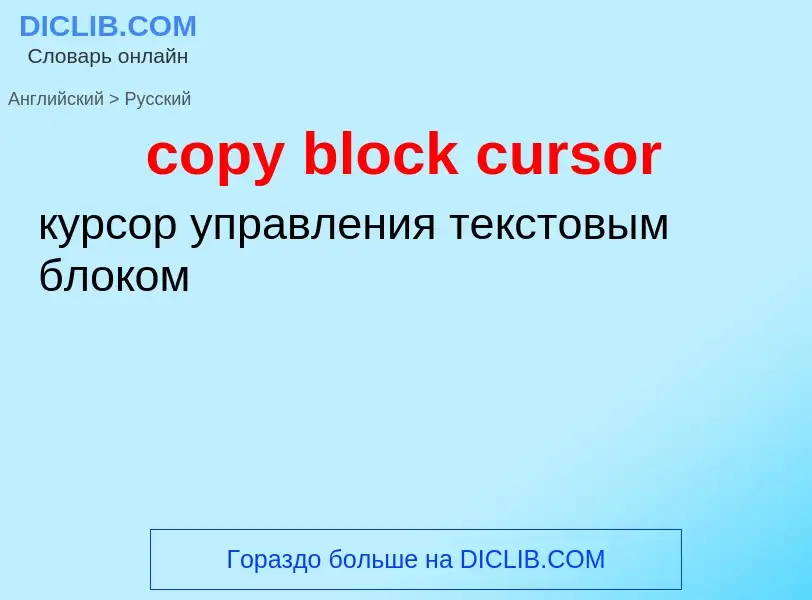ترجمة وتحليل الكلمات عن طريق الذكاء الاصطناعي ChatGPT
في هذه الصفحة يمكنك الحصول على تحليل مفصل لكلمة أو عبارة باستخدام أفضل تقنيات الذكاء الاصطناعي المتوفرة اليوم:
- كيف يتم استخدام الكلمة في اللغة
- تردد الكلمة
- ما إذا كانت الكلمة تستخدم في كثير من الأحيان في اللغة المنطوقة أو المكتوبة
- خيارات الترجمة إلى الروسية أو الإسبانية، على التوالي
- أمثلة على استخدام الكلمة (عدة عبارات مع الترجمة)
- أصل الكلمة
copy block cursor - ترجمة إلى الروسية
['kə:sə]
общая лексика
курсор
различают текстовый курсор и курсор мыши. Текстовый курсор - это мигающий символ на экране (обычно вертикальная линия), показывающий место ввода следующего символа. Курсор мыши - графический значок (часто стрелка), отображающий на экране перемещение мыши и производимые с её помощью операции. Форма курсора в различных приложениях может изменяться в зависимости от выполняемых пользователем или программой действий
медицина
указатель (в приборе)
существительное
техника
стрелка
указатель
движок (на шкале)
стрелка, указатель, движок (на шкале)
электроника
курсор
мигающий квадратик на дисплее
تعريف
ويكيبيديا

The Machine Operating System (MOS) or OS is a discontinued computer operating system (OS) used in Acorn Computers' BBC computer range. It included support for four-channel sound, graphics, file system abstraction, and digital and analogue input/output (I/O) including a daisy-chained expansion bus. The system was single-tasking, monolithic and non-reentrant.
Versions 0.10 to 1.20 were used on the BBC Micro, version 1.00 on the Electron, version 2 was used on the B+, and versions 3 to 5 were used in the BBC Master series.
The final BBC computer, the BBC A3000, was 32-bit and ran RISC OS, which kept on portions of the Acorn MOS architecture and shared a number of characteristics (e.g. "star commands" CLI, "VDU" video control codes and screen modes) with the earlier 8-bit MOS.
Versions 0 to 2 of the MOS were 16 KiB in size, written in 6502 machine code, and held in read-only memory (ROM) on the motherboard. The upper quarter of the 16-bit address space (0xC000 to 0xFFFF) is reserved for its ROM code and I/O space.
Versions 3 to 5 were still restricted to a 16 KiB address space, but managed to hold more code and hence more complex routines, partly because of the alternative 65C102 central processing unit (CPU) with its denser instruction set plus the careful use of paging.


